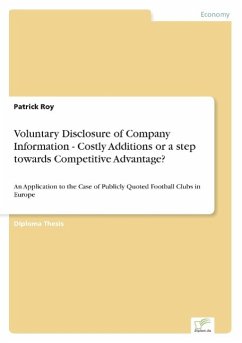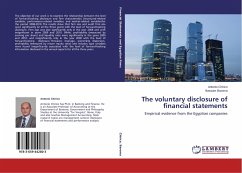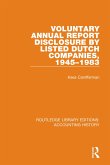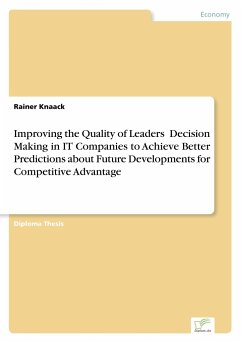Diploma Thesis from the year 2000 in the subject Business economics - Business Management, Corporate Governance, grade: 1,7, ESCP Europe Business School - Campus Berlin (Wirtschaftswissenschaften), language: English, abstract: Abstract:
In a first step, this ERP derives the theoretical necessity to provide voluntary strategic and non-financial Information. It is argued that companies are an integral part of a common environment and society, acting in a framework of interdependent relationships. A company is more and more seen as a community of interests of different groups, and it can only act in an optimal way if the demands of all groups are taken into account and its behaviour is adjusted accordingly. In this context, interest groups' demands for company Information depend an the possibilities of improvements in decision making or monitoring that arise with its use, which in turn is mainly determined by the potential of Information to reduce uncertainty in the areas of interest. For external decision-makers, uncertainty often arises from sources about which conservative company statements provide little insight. Due to the traditional, finance-oriented concept of disclosure, this is particularly true for strategic and non-financial aspects. Related additional Information that is voluntarily provided can considerably reduce uncertainty, even more so as part of audited statements. Conventional financial reporting and existing disclosure requirements will generally not nearly satisfy those information needs of user groups.
Any economic action, though, should only be taken if related benefits are exceeding related costs. This priority of economicalness also holds for companies' production, processing and disclosure of Information. Therefore, it is necessary to consider as detailed as possible potential opportunities and disadvantages for voluntarily disclosing company Information both an and outside capital markets. This is done in a second major part of the present work. First, voluntary disclosure can potentially affect share prices and thereby the market value of the firm, markets not being strong-form efficient. So, by giving company Information, a higher market value can directly be induced, thereby potentially lowering the cost of capital which, for example, improves the company's competitive position in the battle for cheap additional financing. [...]
Hinweis: Dieser Artikel kann nur an eine deutsche Lieferadresse ausgeliefert werden.
In a first step, this ERP derives the theoretical necessity to provide voluntary strategic and non-financial Information. It is argued that companies are an integral part of a common environment and society, acting in a framework of interdependent relationships. A company is more and more seen as a community of interests of different groups, and it can only act in an optimal way if the demands of all groups are taken into account and its behaviour is adjusted accordingly. In this context, interest groups' demands for company Information depend an the possibilities of improvements in decision making or monitoring that arise with its use, which in turn is mainly determined by the potential of Information to reduce uncertainty in the areas of interest. For external decision-makers, uncertainty often arises from sources about which conservative company statements provide little insight. Due to the traditional, finance-oriented concept of disclosure, this is particularly true for strategic and non-financial aspects. Related additional Information that is voluntarily provided can considerably reduce uncertainty, even more so as part of audited statements. Conventional financial reporting and existing disclosure requirements will generally not nearly satisfy those information needs of user groups.
Any economic action, though, should only be taken if related benefits are exceeding related costs. This priority of economicalness also holds for companies' production, processing and disclosure of Information. Therefore, it is necessary to consider as detailed as possible potential opportunities and disadvantages for voluntarily disclosing company Information both an and outside capital markets. This is done in a second major part of the present work. First, voluntary disclosure can potentially affect share prices and thereby the market value of the firm, markets not being strong-form efficient. So, by giving company Information, a higher market value can directly be induced, thereby potentially lowering the cost of capital which, for example, improves the company's competitive position in the battle for cheap additional financing. [...]
Hinweis: Dieser Artikel kann nur an eine deutsche Lieferadresse ausgeliefert werden.








